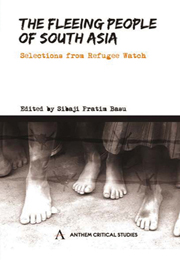Book contents
- Frontmatter
- Contents
- Acronyms and Abbreviations
- Foreword by Ranabir Samaddar
- Preface
- ETHICAL ISSUES
- LAWS
- Introduction
- Human Rights, Humanitarian Laws and the Continuing Displacement in Sri Lanka
- The Foreigner and the Right to Justice in the Aftermath of September 11th
- Exclusion from Refugee Protection in Europe: An Attempt at Legal Conceptualization
- Women's Rights, Asylum Jurisprudence and the Crises of International Human Rights Interventions
- Strengthening Protection of the IDPs
- French Suburbia 2005: The Return of the Political Unrecognized
- SOUTH ASIA
- INDIA
- GENDER
- INTERVIEW/CORRESPONDENCE
- REPRESENTATIONS
- Index
Exclusion from Refugee Protection in Europe: An Attempt at Legal Conceptualization
from LAWS
Published online by Cambridge University Press: 05 March 2012
- Frontmatter
- Contents
- Acronyms and Abbreviations
- Foreword by Ranabir Samaddar
- Preface
- ETHICAL ISSUES
- LAWS
- Introduction
- Human Rights, Humanitarian Laws and the Continuing Displacement in Sri Lanka
- The Foreigner and the Right to Justice in the Aftermath of September 11th
- Exclusion from Refugee Protection in Europe: An Attempt at Legal Conceptualization
- Women's Rights, Asylum Jurisprudence and the Crises of International Human Rights Interventions
- Strengthening Protection of the IDPs
- French Suburbia 2005: The Return of the Political Unrecognized
- SOUTH ASIA
- INDIA
- GENDER
- INTERVIEW/CORRESPONDENCE
- REPRESENTATIONS
- Index
Summary
BACKGROUND
The interpretation and application of the Exclusion Clauses under the 1951 Convention on the Protection of Refugees has been evolving, factoring in historical and political considerations, not all of which proved to be conducive to securing a comprehensive legal framework designed for refugee protection. In the 1990s, Western Europe faced an unprecedented rise in applications for refugee status, prompting the European Union (EU) member states to tighten borders to keep out ‘illegal migrants’, to shorten asylum procedures, to limit the right of appeal and to pass on responsibility to other nations – ‘safe third countries’ – through which asylum seekers travelled en route to Western Europe. […] The application of the Exclusion Clauses under Article 1F of the Convention is a case in point. United Nations High Commissioner for Refugees (UNHCR) has consistently argued in favour of a restrictive interpretation of the Exclusion Clauses, given the legal nature of the provisions as an exception from Article 1A and the potentially serious consequences of exclusion from Convention protection. But state practice is far from homogeneous and a range of problems regarding the interpretation and application of the Exclusion Clauses persist. […]
At the same time, demographic trends suggest that a comprehensive overhaul of immigration laws and policies is required for Western European countries to avoid a slump in population and a subsequent economic backlash. In several countries, legislation has been adopted or brought underway with a view to pave the way for eligible foreign nationals to be granted citizenship.
- Type
- Chapter
- Information
- The Fleeing People of South AsiaSelections from Refugee Watch, pp. 91 - 102Publisher: Anthem PressPrint publication year: 2009



